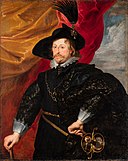Election Sejm of 1632

|
|||||||
|---|---|---|---|---|---|---|---|
|
|||||||
|
|||||||
|
|||||||
The Election Sejm of 1632 (September 27 – November 8, 1632, extended to November 13, 1632) was the Polish-Lithuanian Commonwealth's election sejm that elevated Władysław IV to the Polish throne. Władysław had won the support of most of the political factions; and in the absence of any other serious contenders, he was elected King of Poland and Grand Duke of Lithuania.
While Władysław and his father Sigismund III Vasa tried to ensure Władysław's election during Sigismund's lifetime, the option of premature succession was not popular with the nobility; the Vasas' repeated attempts failed, up to and including at the Sejm of 1631. The question of succession was resolved soon enough however, upon Sigismund's sudden heart attack on 23 April 1632 and death in the morning hours of 30 April.
Every Polish-Lithuanian election Sejm was preceded by a convocation Sejm. In accordance with the dictates of the law, the Primate of Poland, Jan Wężyk, acting as Interrex, summoned a convocation sejm for June 22, 1632, which lasted through August 17.Krzysztof Radziwiłł was selected as Marshal of the Sejm. Non-Catholics, led by Marshal Radziwiłł and the magnate Bogusław Leszczyński, demanded increased rights; they were opposed by Voivode Tomasz Zamoyski and the future Bishop Aleksander Trzebiński, but managed to gather enough support that this question dominated the ensuing election sejm.
...
Wikipedia

